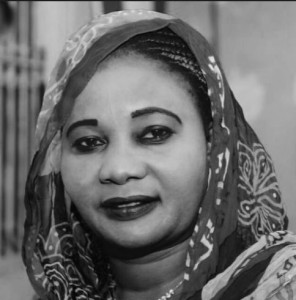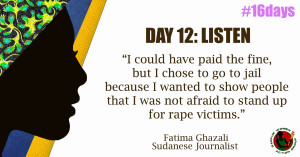#16 Days Survivor Stories: Fatima Gazali
I Went to Jail Because I am Not Afraid Stand Up for Rape Victims
 “I was born in Kurdufan, an area in Western Sudan. My family is from Darfur and still live there, so I consider myself to be a Darfuri as well. As a child, I used to enjoy watching movies on television, particularly the ones that had female characters that were journalists. They seemed so empowered and independent – everything that I wanted to become someday. As a teenager, I began imitating those characters by writing for school magazines and newspapers. I eventually went to college to study journalism. In 2001, I graduated and started working for a local newspaper in the capital of Sudan.
“I was born in Kurdufan, an area in Western Sudan. My family is from Darfur and still live there, so I consider myself to be a Darfuri as well. As a child, I used to enjoy watching movies on television, particularly the ones that had female characters that were journalists. They seemed so empowered and independent – everything that I wanted to become someday. As a teenager, I began imitating those characters by writing for school magazines and newspapers. I eventually went to college to study journalism. In 2001, I graduated and started working for a local newspaper in the capital of Sudan.
Soon after that, genocide broke in Darfur, and my job suddenly gained an importance that I never expected. In 2004 I traveled to Darfur to cover the violence and the humanitarian crisis that were unfolding. It was a very risky assignment, but the news coming from the area was so restricted that I needed to travel to Darfur in order to understand what was happening. Why was the government attacking its own people? Why were Darfuris being pushed out of their villages and forced to live in IDP (Internally Displaced Person) camps? There were so many questions on my mind. At the time, the conflict was still considered a civil war, but it became more and more clear that it was, in fact, a genocide.
I traveled through villages and visited IDP camps, where I interviewed many women. I heard shocking stories of women who had been raped by government-sponsored forces. Others told me that their children were violated. Many more were struggling to provide for their families after being uprooted from their homes and moved into camps, where they did not have access to basic needs – such as education, health assistance, and security. The stories that I heard stayed with me. I was so touched that after the trip I decided to focus my career on women’s rights and human rights issues.
This decision soon got me into trouble. Every time that I wrote an article or column on the topic of violence against women, members of the Sudanese Security Services would take me into an interrogation room, question my reporting and motivations, and at times even detain me for a few days. It became clear that the government of Sudan did not want local journalists writing about what violence against women, particularly women in Darfur. Probably because often the perpetrators of such violence were army officers or members of government-supported militia groups. Through intimidation, they were trying to force me to write about other issues, that would not damage the government’s image.
The pressure intensified in 2011, when I wrote about Safiya Ishaq for the independent newspaper Al-Jareeda. Ms. Ishaq, a 24-year-old student-activist from Sudan University, was arrested for participating in a rally and handing out flyers. While in the custody of Sudanese Security Services, she was brutally beaten and repeatedly gang-raped. Her story evoked a lot of anger among Sudanese women and civil society leaders. I wrote a column praising her courage, requesting an investigation into her accusations and demanding accountability for the perpetrators.
The Sudanese government not only questioned me about my column, but  also took me to court and unjustly charged me with the crime of “publishing false news”. A Sudanese court tried my case and ruled that I was guilty. A judge sentenced me to one month in jail, unless I paid a fine of 2,000 Sudanese pounds (US$ 300). Five other journalists were accused of the same crime at the time, but were released. Another female journalist was sentenced along with me, but she filed an appeal and was also released. I believe that I was particularly targeted because I have roots in Darfur – and the government does not look kindly on Darfuris.
also took me to court and unjustly charged me with the crime of “publishing false news”. A Sudanese court tried my case and ruled that I was guilty. A judge sentenced me to one month in jail, unless I paid a fine of 2,000 Sudanese pounds (US$ 300). Five other journalists were accused of the same crime at the time, but were released. Another female journalist was sentenced along with me, but she filed an appeal and was also released. I believe that I was particularly targeted because I have roots in Darfur – and the government does not look kindly on Darfuris.
I could have paid the fine, but I chose to go to jail because I wanted to show people that I was not afraid to stand up for rape victims. As a result, I was in Omdurman Women’s Prison for more than one month (my story even made international news headlines). While behind bars, I met many women who were suffering horrific human rights abuses. Those encounters inspired me to continue to write about women’s issues and human rights. I left prison even more convinced of the importance of my role as a journalist in Sudan and determined to continue my work.
My hope for the future is to further my education and upgrade my skills and knowledge. I already have a master’s degree in Peace and Conflict Resolution and another in Gender and Governance from the Ahfad University for Women, but I still have so much to learn. I also want to continue to advocate for women’s rights through my writing. Many still do not know the daunting challenges that Sudanese women face on a daily basis. Women are denied quality education and healthcare, they are oppressed by the law, and frequently undermined by the Sudanese government and by society. Life is very difficult, even in areas where there is peace. Of course, in conflict areas the situation is much worse. Women suffer with the bombing of their homes and the death loved ones. And they live in constant fear of being raped by the Janjaweed (government militia).
I am so happy to speak with you. Darfur Women Action Group (DWAG) does such a great job of developing strategies to support and empower women from Darfur. I also admire that you speak up about genocide and pressure the international community to take action. Sudanese women need advocates all around the world to provide them with strength and support. I am very proud of DWAG and the work you do, and I sincerely thank you for giving me the opportunity to contribute. I hope that your readers can support DWAG’s efforts to provide Darfuri women with opportunities for a better life.”
—
TAKE ACTION. Please join us in taking at least one action that will help end violence against women in Darfur:
- Raise awareness by sharing our campaign content on social media, using the hashtags #16Days and #StopRapeInDarfurNow.
- Tag United Nations on social media and demand accountability for the 2014 mass rape in Darfur. Share it with 10 people in your network. Use @UN on Twitter and @UnitedNations on Facebook.
- Donate to DWAG to support a rehabilitation center for women survivors of sexual violence in Darfur.
- Join our Rapid Response Network, a group of community members who are on standby to help us with campaigns and petitions.
- Send a solidarity message that we can share with our supporters and the women in Darfur: communication@darfurwomenaction.org.



